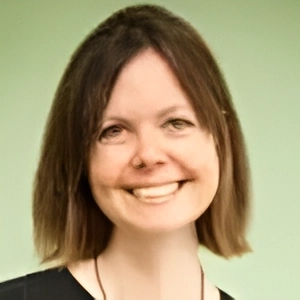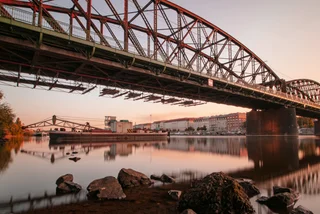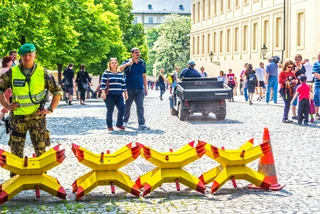For six months; beginning in January 2009, representatives from all over the European Union, indeed the whole world, will be popping over to Prague and the Czech Republic. This is because the country will hold the rotating EU presidency through June 2009. To get an idea of what will be happening; we spoke with Michaela Jelínková, a spokesperson in the Office of the Government, Cabinet of the Deputy Prime Minister for European Affairs.
The Czech government has two offices dealing with European affairs and right now, the upcoming presidency. Much of the work comes out of the Office of Vice Prime Minister for European Affairs, Alexandr Vondra. He´ll be the big cheese during the reign. There are a number of departments in his office preparing for the Czech EU presidency including one in charge of preparations and another preparing Czech positions for EU meetings. Jelínková says all concerned have been organizing for more than two years and throughout the government about 1500 people are working on some aspect of the presidency. News reports have estimated costs for hosting the presidency to be more than three billion Czech crowns from start to finish.
PARTNER ARTICLE
There´s a lot to prepare for. Jelínková says throughout the six months about 30,000 people will come through the country. This includes delegates; EU ministers; people working in other EU bodies (like the Commission) as well as leaders from around the world.
The Czechs will be organizing all meetings of the Council and its working groups; prepare the agenda for these meetings and determine the order of debated issues based on their priorities. They are preparing for more than 300 lower level expert meetings alone that will mainly be held in Prague at the Congress Center. These meetings are comprised of delegates from all the EU countries; working on a specific issue. The delegates are specialized in certain subjects that the EU needs to deal with; be it agriculture or social affairs.
There will also be a number of minister level meetings. These will have each of the ministers from the 26 EU member states and be chaired by the Czech minister. Which minister is involved depends on the topic being discussed. If it´s foreign affairs; all the foreign affairs ministers from the EU countries will attend.
The EU commissioner responsible for the particular business will also be present. What´s important for the Czech Republic is that their ministers will be chairing the discussions; giving them an opportunity to raise their profile within the EU. Jelínková points out though that as chair; you can´t necessarily promote your agenda, but need to be an impartial leader.
About half of these minister level meetings will be held outside of Prague. Jelínková says certain criteria went into selecting the cities; including that the location had to be beautiful, there had to be good traffic accessibility and suitable venues with congress capabilities.
The cities chosen include Brno, Ostrava, Olomouc, Mariánské Lázně, Luhačovice, Litoměřice and Hluboká Castle. Jelínková says this is an example of how the Czech EU presidency can stimulate the regions. With the initiative of local people the presidency served as a motivation to improve facilities. She says Mr. Vondra visited all the areas in September and noticed a lot of interest and cooperation. She believes the regions understand the opportunity they have and are ready.
The Czech Republic does have a unique opportunity to show itself off. While the ministers are here; recreational programs will be offered to introduce them to the region they are visiting. Jelínková says this is a typical feature of these informal minister meetings. No binding political decisions are made; but they are used as a forum to exchange information in an informal arena. And if the minister´s wives come; they´ll be kept busy with a program of their own.
Jelínková believes their office and the government are prepared for the upcoming six months. She says it´s difficult to predict how it will all end but she hopes the Czech presidency will be remembered as one that had a competent government and ministers and the leadership to moderate the EU discussions and to have concrete measures and projects to look back on.












 Reading time: 3 minutes
Reading time: 3 minutes 


























